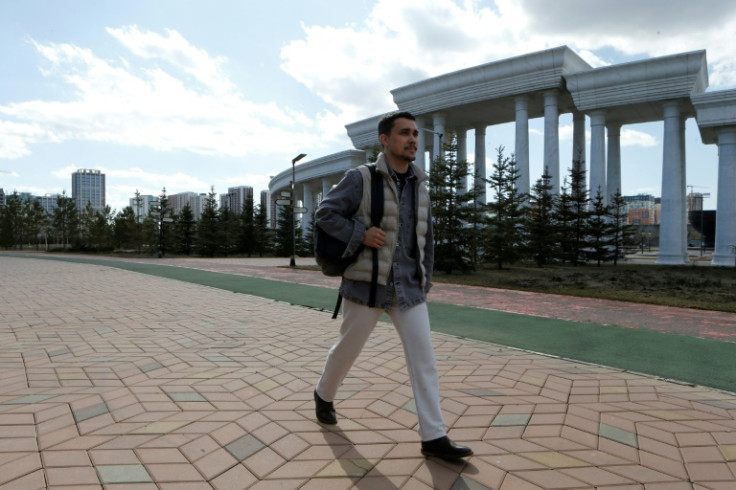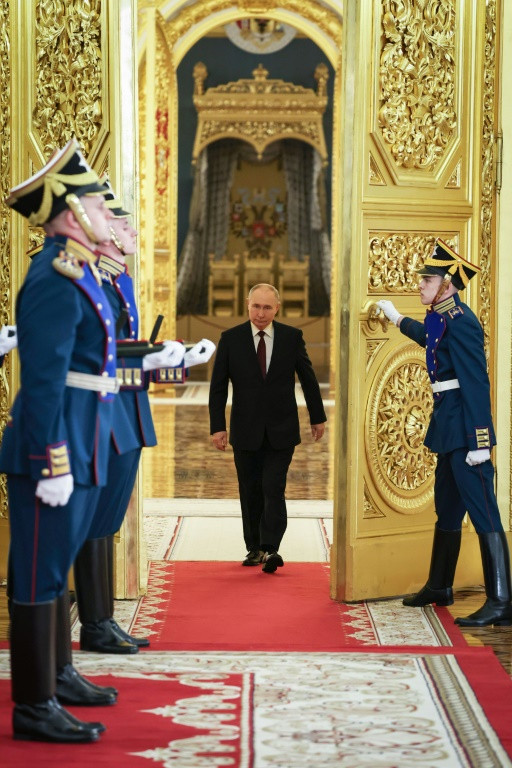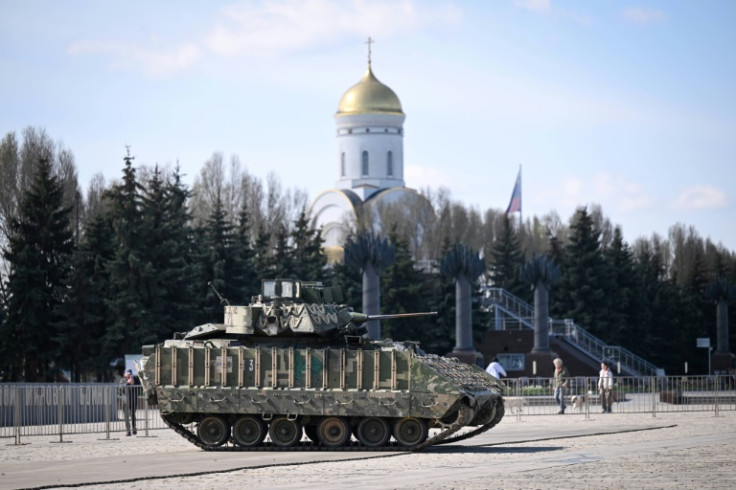Shunned By West, Russian Army Deserters Live In Fear

Russian officer Farkhad Ziganshin had prepared himself for a life of military service since a young age. He could never have imagined that one day he would become a deserter and flee the country.
Russia's invasion of Ukraine changed everything.
"I don't support what's happening in Ukraine, I don't support the government we've had for so many years," Ziganshin, 24, told AFP in Kazakhstan, where he fled in September 2022 after Vladimir Putin ordered Russia's first military mobilisation since World War II.
Faced with a choice between taking part in a war of aggression or going to prison for refusing to fight in Ukraine, hundreds of deserters and draft dodgers have fled to neighbouring ex-Soviet countries where they are now stuck in limbo.
Russian authorities have opened a criminal case against Ziganshin for abandoning his unit. He does not feel safe in Kazakhstan and fears he might be deported to Russia.
But it is hard for men like him to seek refuge in the West because many Russian servicemen do not have the Russian passport that allows travel to Europe and only have documents that permit them to reach neighbours such as Kazakhstan or Armenia.
Anti-war activists urge European and US policymakers to do more to help men like Ziganshin, who are hunted at home and viewed with suspicion in the West.
While in Kazakhstan, Ziganshin was briefly arrested twice, most recently in June.
He is not giving up, however. He openly speaks of his opposition to Putin and the war in Ukraine with foreign journalists.
Together with other opponents of the war he has recorded videos to encourage Russians to flee the battlefield as part of an initiative dubbed "Farewell to arms".
In one such video, a serviceman sets fire to a uniform bearing the letter "Z", a symbol of Moscow's invasion of Ukraine, before heading for the nearest forest.
"No one attacked your homeland," says a message at the end of the clip. "We have already refused to take part in a criminal war. You should too."
Ziganshin went to a military boarding school at the age of 10 and graduated from a military academy that prepares Russian tank commanders.
He describes the Russian armed forces as a "great school of life". But when Russia invaded Ukraine, he realised this was not the army he wanted to dedicate his life to.
He managed to resign, only to learn the next day that a military mobilisation had been declared and that he would be deployed to Ukraine, along with around 300,000 other men.
Ziganshin packed up in a hurry and fled to neighbouring Kazakhstan. Afraid of being sent back to Moscow, where he will be criminally prosecuted, he has been trying to acquire a visa to travel to France.
Kazakh rights campaigner Artur Alkhastov said Russian deserters stand virtually no chance of receiving refugee status in the Central Asian country.
"We've got really strong diplomatic ties with Russia," said Alkhastov.
Campaigners have also accused local authorities of facilitating the arrests of Russians who have sought refuge in Kazakhstan.
Mikhail Zhilin of the Russian Federal Guard Service fled to Kazakhstan to avoid the draft, illegally crossing the border. He was sent back to Russia and last year sentenced to six and a half years in prison.
Russian contract soldier Kamil Kasimov, who also fled to Kazakhstan, this spring was detained and taken to a Russian military base in the town of Priozyorsk in central Kazakhstan, according to activists.
Ziganshin shudders at the thought of being sent back to Russia where he faces a long prison term. His Kazakh residence permit has expired.
"I'm young, I want to do something with my life, I want to live with dignity," he said.
Other Russian army deserters have fled to Armenia in the South Caucasus. But like Kazakhstan, activists say the country hosting a Russian military base is also not a safe destination. Two Russian deserters have been detained by Russian military personnel in Armenia over the past two years.
European countries remain out of bounds, said Ivan Chuviliaev, spokesman for anti-war Russian project Idite Lesom ("Get lost"), which has been helping Russians to desert and leave the country.
"They have no documents to put a visa in," he said.
Andrei Yuseinov, who served in the 39th motorised rifle brigade in Sakhalin in Russia's Far East, was lucky enough to escape to Georgia.
He said he had "forged his story" and passed himself off as a civilian in his home town of Orenburg in order to obtain a passport, which enabled him to travel to Georgia with his wife and child.
The 24-year-old said he refused to die "an absurd death" in Ukraine.
"I used to see mothers crying in front of officers who didn't answer them even though they knew their children were dead," Yuseinov said.
Campaigners and Western governments have been concerned about Georgia's recent pro-Russian drift and Yuseinov believes he is not safe there.
He hoped to travel to France but in May, the French embassy in Tbilisi refused to issue him a visa.
Since Moscow's invasion of Ukraine, many Russians have sought to find refuge in France, which has a long tradition of welcoming political exiles.
Last year, the country's National Court of Asylum (CNDA) threw a lifeline to military deserters and draft dodgers too, ruling that "Russians fleeing mobilisation for the war in Ukraine and those mobilised who have deserted can obtain refugee status".
According to the CNDA, 102 Russians fleeing mobilisation have already been granted refugee status in France. There are no army deserters among them.
Obtaining refugee status or even receiving a visa to travel to EU countries is difficult for many Russians, and activists are urging European governments to do more to help.
"They are real resistance fighters, they are not only soldiers who refused to risk their lives," said Olga Prokopieva, head of Russie-Libertes, a Paris-based association.
"We would like France to become more involved, in particular with deserters who have found themselves stuck in Armenia and Kazakhstan."
Artem Klyga, a lawyer working with the Movement of Conscientious Objectors, has been lobbying the French and German governments to help Russians fleeing the battlefield.
He said both countries understood the scale of the problem but were also wary of welcoming servicemen who might have committed war crimes.
"I usually hear that all these Russians are war criminals, so you need to block them in Russia," he said.
The German foreign ministry said anti-war Russians who are "particularly at risk of persecution" can be welcomed on humanitarian grounds.
Vladimir (not his real name) is one of the war refuseniks who managed to obtain asylum in France.
The 30-year-old reservist said he was "harassed" in the early months of the war, with Russian military personnel coming first to his home, then to his place of work and to his mother's home in an effort to enlist him.
"The fear grew," said Vladimir.
In May 2022, he left for France to avoid being drafted. Soon after, his mother received his military summons. The CNDA granted him refugee status in April after two years of proceedings.
Dmitry (not his real name), a dance teacher in his 30s, said he did not want to "take up arms to kill other people".
He fled Russia in September 2022, a few days after receiving a military draft notice. He was granted asylum in April.
Oleg (not his real name), a combat sports instructor in his 40s, said he has "always been against Putin".
He said his wife took part in protests organised by allies of Alexei Navalny, the opposition leader who suddenly died in an Arctic prison in February. Oleg took part in a fund-raising campaign for a Ukrainian friend whose home was destroyed as a result of the Russian invasion, he said.
After Oleg received his summons, he, his wife and their two children left for Georgia in September 2022.
He received refugee status in France in April.
"If we hadn't left, I'd either be in prison or on the battlefield," said Oleg.
Alexander, 34, his wife Daria, 37, and their two children are still waiting for the French authorities to decide their fate.
The family fled Saint Petersburg in March 2023, after Alexander, who is an engineer, received his draft notice.
Their car and the front door of their flat were vandalised due to Daria's anti-war activism.
The family, who are residing in a town in northern France, have left behind a comfortable life.
Alexander said he had no regrets. "I saved my family and did not become a murderer," he said.
Activists say that if Western countries want to better support Ukraine they should offer asylum to Russian deserters.
"If we want the Russian army to be weaker, we have to support deserters," said Chuviliaev.
Independent Russian-language media outlet Mediazona has recorded around 8,600 AWOL cases since the start of the mobilisation in September 2022. By comparison, just over 600 such cases were brought before the courts in 2021. Charges of desertion have also soared, with more than 300 cases brought before courts since the start of the draft, according to Mediazona. That compares to 33 such cases in 2021.
Russian deserters should be welcomed in the West, not stigmatised for having served in the Russian army, said a spokeswoman for InTransit, an organisation that helps men flee the war.
"If you're just an activist and you went to a few demonstrations, you can receive a humanitarian visa. But if you were in the army and shot yourself in the leg and ran away," she said, "then you don't get any visa."



© Copyright AFP 2025. All rights reserved.





















